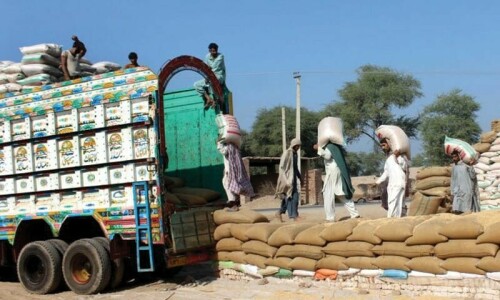LAHORE: The Lahorites and the city traffic police had a tough day on Tuesday as the protesting farmers kept Multan Road – one of the main arteries connecting central Punjab with its southern part – closed and occasionally blocked the motorway.
The blockade created pressure on almost all roads and the entire southern part of the city – residential localities on Canal Road, Raiwind Road, Faisal Town and Johar Town.
Hundreds of farmers from south Punjab have been holding a peaceful protest march for the last 24 hours against shifting of three sugar mills from their area to central part of Punjab.
The Lahore High Court had recently ordered the transfer of the sugar mills from Bahawalpur, Rahim Yar Khan and Muzaffargarh to central Punjab, where these units were originally established.
According to Chief Traffic Officer (CTO) Rai Ijaz, he deployed 100 additional wardens, 30 patrolling officers and seven sector in-charges to keep the traffic at least flowing, albeit slowly.
The traffic police have been working in close coordination with the National Highway and Motorway Police to help traffic flow as much as possible.
“We have also issued travel advisory, identifying the alternative routes – where possible – but with heavy traffic hogging the roads, the problems are natural,” he told Dawn.
However, this effort of traffic police and the city administration fell far short of the expectations of the city dwellers.
“One fails to understand, why these protesters are allowed so close to the city,” wonders Muhammad Akram, who lives in Wapda Town – one of the ‘besieged’ localities.
It happened on last many occasions when the same organisation protested but was kept out of the city, negotiated with and dispersed. How come that the city administration only realised their presence when they arrived, where they wanted to reach, to maximise the impact? It needs to be answered, he said.
“This laxity, or deliberate delay, has given rise to allegations that since the mills ordered to be back to their original location, belong to the Sharif family, it was they who encouraged, if not arranged, the march,” claimed Muhammad Waris Khan – a city resident who suffered two-hour blockade.
The protest was arranged by one of the two factions of Pakistan Kissan Ittehad (PKI) led by Chaudhry Anwer.
The other faction of the PKI, led by Khalid Khokhar, claimed that the son of Abbas Sharif arranged the protest to create social pressure for keeping the mills, where they are.
“The farmers are demanding to let the mills stay in South, at least for the current crushing season that will start next month. Otherwise their cane crop can suffer badly,” he said.
Published in Dawn, October 18th, 2017













































Dear visitor, the comments section is undergoing an overhaul and will return soon.